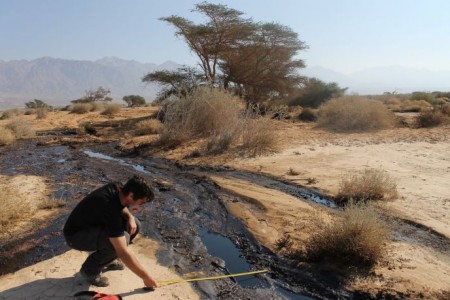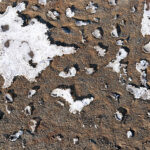May 22, 2015 – Researchers at Hebrew University of Jerusalem have developed a product that oxidizes soil polluted by oil and other contaminants. According to an article appearing in the May 22, 2015 edition of Haaretz, one of Israel’s leading daily newspapers, the product, known as NHS+ reagent, was developed at the Casali Institute of Applied Chemistry. The product can be used at the site of a spill and within a few hours turns oil in the soil into carbon dioxide and water. Its inventors, Professor Yoel Sasson and Dr. Uri Stoin, refer to it as a hydrocarbon destructor that works on oil or solvent spills.
The technology went from the laboratory at Hebrew University to Yissum Research and Development, a technology transfer company the university set up in 1964. Yissum handles more than 8,900 patents, 2,500 inventions and has licensed 800 different products and processes globally. This has spawned 90 different companies which generate more than $2 billion U.S. in annual sales. The range of technologies coming out of Hebrew University that Yissum has commercialized cover agriculture and food, chemistry and materials science, clean up and environmental technologies, computer science and engineering, life sciences, biotechnology, veterinary and animal sciences.
In the case of NHS+ reagent, it has been sold to the Man Oil Group, a Swiss company. In December 2014 they conducted a desert pilot at an Israeli landfill site containing contaminated soils. The process of application took approximately two hours and within a few hours after the reagent had converted 80 to 90% of the hydrocarbon contaminants to carbon dioxide and water.
Now consider the potential value this technology represents with oil increasingly being shipped in North America from points of origin, like the Alberta oil sands, to refineries and transhipment terminals. Along all these routes the chance of spills, although small, warrants investing in this type of product. And if you have ever walked along a railway track it is certainly not an uncommon site to see the residue from petroleum and solvents on the ties and surrounding soil, tens of thousands of contaminated square kilometers. An inexpensive oxidizing solution such as NHS+ reagent can eliminate the contaminants ensuring they don’t end up in runoff impacting neighbouring lakes, ponds, rivers and groundwater.
According to its developers NHS+ reagent is more reliable than detergents or the biological agents commonly used today for oil spill clean up. Detergents leave residual chemicals in the soil which then means it has to be carted away. For biological agents, the soil too must be first removed before a bacteria is applied. The process can take months or even years before decontamination. With this new reagent, however, application is done at the site without any impact on flora or fauna and without damage to surrounding or buried infrastructure.
For the foreseeable future while we still rely heavily on oil for energy, and continue to move it over land, whether by pipeline, rail or truck, we will need clean up technology that can counter the negative impact of spills. This one looks like a good bet!
















